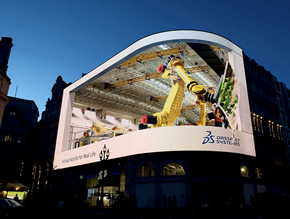AI Rockets to the Top of the Manufacturing Priority List

The AI market in manufacturing, which covers intelligent hardware and software, is expected to reach US$5.46bn in 2028, according to the Business Research Company. Partners from Bain & Company have shared their thoughts on the results.
Bain & Company offers consulting services to a range of industries and provides manufacturers a four-day rapid assessment or a comprehensive one, taking six weeks. We featured Bain & Company in our Top 10 Manufacturing Consulting Companies, for its diagnostics assessments in four critical manufacturing facets: the supply chain, footprint design, plant performance and Industry 4.0.
The rise of AI adoption in manufacturing
Results from the report showed attitudes to AI adoption are shifting. 75% of executives say that adopting emerging technologies, like AI, is their top priority in engineering, as well as R&D.
Meanwhile, Gen AI is anticipated to transform business across the sectors, as it has the ability to identify hidden insights from unstructured data, which can lead to dramatic improvements in:
- Productivity
- Customer service
- Financial performance.
AI can also spot potentially expensive errors in real time, to improve assembly efficiency and avoid unwelcome supply chain delays. One machinery original equipment manufacturer reported that by adopting an AI-based video processor to monitor manual assembly activities it had successfully:
- Automated quality checks of manual assembly activities
- Supported the use of resources and employees.
Such solutions helped the machinery OEM reduce failures across the assembly process by 70%, while also cutting down efforts for quality checks by up to 50%.
AI has been credited for supporting employee productivity, especially for those companies who are short on staff. In one example, an AI-powered industrial copilot which can convert natural language into code and translate programming languages, has saved time compared to using human developers. For those engineers using this AI solution, there was a rise of 5% in productivity.
Closing the manufacturing skills gap
According to another report “Taking charge: Manufacturers support growth with active workforce strategies” by Deloitte and the Manufacturing Institute (MI), the US manufacturing industry may need up to 3.8m new employees between 2024 and 2033.
Despite the opportunity for these millions of jobs, 1.9m could be vacant if manufacturers are not able to address these skills and applicant gaps.
Read our coverage of the report here.
******
Make sure you check out the latest edition of Manufacturing Digital and also sign up to our global conference series - Procurement & Supply Chain 2024 & Sustainability LIVE 2024
******
Manufacturing Digital is a BizClik brand.
- Top 10: Chief Manufacturing OfficersProduction & Operations
- Taiwan Global Frontrunner In Manufacturing AI AdoptionAI & Automation
- Join Belden for a Free Webinar on Connected Plant Floor DataProduction & Operations
- Exotec: Warehouse Automation & The British Alcohol IndustrySmart Manufacturing






